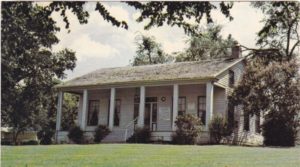
The home Fred Ende built for his bride in 1858. The house was originally two blocks north of the courthouse facing Stonewall Street. Later it was moved to this location in Graham Park before finally restored on the grounds of the Audie Murphy/American Cotton Museum. (author’s photograph)
Last week I shared some of the guests I would invite if I could arrange a Fantasy Dinner with early settlers in Greenville. Today I will complete the resumes of the three remaining guests.
The next two were some of the most respected citizens in town. Fred and Amelia Ende arrived at the Port of New Orleans separately in the 1840s. Fred emigrated to escape conscription in the military. At that time, Germany was a maze of small countries, dukedoms, fiefdoms, city-states, all fighting for fertile, riparian land. Some of the facts are blurry, but it is known that Fred worked as a street sweeper, explored the Mississippi River to New Madrid, and wandered finally into Greenville. He like what he saw, decided to open a mercantile business, and hightailed it back to New Orleans. There he purchased goods for his new store and became reacquainted with the lovely Amelia who agreed to marry him when his store was open and a house was ready.
Some say Fred von Ende, his original German name, was a member of a wealthy German family. However, when he arrived in the United States he discarded the “von” and became Americanized. He hired a carpenter to build his home in 1857-1858. When completed, he returned to New Orleans, married Amelia, took a steamer on the Red River to Jefferson where he bought a buggy and hired a wagon.
His business was a success, both became important citizens, she as a musician and he as a strong supporter of his new hometown. Ende was an early moneylender, supported the campaign to bring railroads here after the Civil War. He was an advocate of desegregation and rights of former slaves. During the Civil War, he gave and sold rations to troops. At that time, the men in town issued US citizenship on him and his wife. However, there are no legal documents to confirm this in the courthouse.
I feel very sorry for the last guest, Rachel Arnold. Her story is typical of 19th century widows. Mrs. Arnold was the wife of Lee Arnold, who was elected sheriff and then Alderman. While living within the city limits of Greenville, Lee Arnold acquired farm tools, work oxen, 50 milch cows and 20 head of hogs. At his death Arnold’s probate showed a house and household goods valued at $2000. He named James Bradley, an esteemed attorney as administrator. In January 1855 Bradley accepted the position of administrator and did nothing, absolutely nothing.
Rachel and the children had no income, no food, no clothing; basically they were destitute. She could not legally manage the estate her late husband left. During the December term of court in 1856, Lee’s brother petitioned for guardianship of the five minor children and Lee’s widow. The guardian finally sold the house in February 1859 for $800. No cemetery records or marriage records or census records exist after Lee’s death for Rachel. I would love to hear her side of the story.
So two attorneys, a Colonel in the Texas Rangers, a couple who were German immigrants, a wealthy woman who cohabited with her father-in-law for over twenty years, and a widow almost turned out in the cold sitting around the dining room table. What a wonderful conversation would have transpired. And if Lindley Johnson had his way, the spirits flowed freely.
